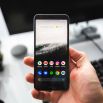Autralia's prime minister, Julia Gillard, is one of the first lucky few to try out Google Glass in the country. It shows that Google is definitely looking to extend its global outreach and Gillard seems to be enjoying the novelty of it.
What we know of Google's Project Glass so far is that its earliest potential date of public release is in 2014 — the price is estimated to be about the same as a smartphone, so in the range of $750. Developers may get their hands on "explorer editions" this year, with the pre-order priced at $1500.
According to a video by Project Glass showing all its potential capabilities, the purpose of Google Glass is to augment reality, delivering information to the user that is immediately relevant to their surroundings. TechRadar posits that it could potentially be used to find a restaurant near you, book a table and invite your friends, or used for research at work.
The specs use a transparent LED or AMOLED display to show information directly to users, and bone induction to vibrate sound directly into your skull. Seth Weintraub from 9to5Google says that the device is meant to be stand-alone rather than dependent on smartphone connectivity, though it has the function. An FCC report suggests Wi-Fi and Blutooth capability as well. It also shows that the Glasses will be charged via its frame, and Google developers are working to develop a version that would not interfere with existing frames should a user already be wearing glasses.
The Glasses will run Android, according to the NY Times, and will use motion sensors — you control it via head-tilts and voice commands. It will also feature 3G or 4G data connections and GPS. It has a front-facing camera with flash and instead of accessing internal storage, all information is deposited on and retrieved from the Cloud.
While Google certainly believes this technology is feasible, Blair MacIntyre, director of the Augmented Environments Lab at Georgia Tech, told Wired that augmented reality on this kind of display would not work. "The small screen seen in the photos cannot give the experience the video is showing," he said.
Other users fear that Google, which makes its fortune on selling advertisements, will use the Glasses as another way to beam commcercials at you 24/7, though it seems unlikely that the search engine giant would make its wearable computer so unappealing.









